PLEASE NOTE:
While the following article relates to your Google search, the services and methods at Goodwin Hypnosis may differ from those mentioned below. Since 2007, we have helped thousands of clients to overcome emotional and behavioral challenges when all else had failed. According to many of them (and their referring healthcare providers), our methods are faster than talk therapy, easier than willpower, and safer than medication. If you’re ready to resolve your issues, skip the article and visit the rest of our website, where you can learn about our unique approach, watch client testimonial videos, and discover how working with us one-on-one could be the solution you’ve been searching for.
We can help you with a variety of issues relating to emotional trauma. While we don't diagnose disorders like PTSD, we have helped hundreds of clients to overcome a wide range of traumatic experiences and their negative effects with methods that are more efficient and comfortable than CBT or EMDR. If you would like to learn more about working with us one-on-one to clear your trauma, click here.
Introduction
Navigating the aftermath of trauma can be an overwhelming journey, especially when it disrupts the fundamental need for restful sleep. Trauma-induced insomnia is a common yet often overlooked consequence that leaves individuals in a constant state of exhaustion, grappling with racing thoughts and heightened anxiety. Understanding this connection is vital for those seeking healing, as it opens the door to effective recovery strategies.
From cognitive behavioral therapy to mindfulness practices, various approaches can help restore not only sleep quality but also emotional well-being. By exploring these techniques and recognizing the importance of a supportive environment, individuals can take meaningful steps toward reclaiming their nights and nurturing their overall health.
The Psychological Effects of Trauma-Induced Insomnia
Trauma can deeply interfere with rest, often appearing as sleeplessness that leaves individuals feeling fatigued and overwhelmed. When distress occurs, it can trigger a state of hypervigilance, making it exceptionally challenging to unwind and drift into restful sleep. This constant state of alertness commonly leads to racing thoughts and heightened anxiety, both of which are significant contributors to sleeplessness.
Significantly, research shows that individuals who suffer from sleep disturbances after experiencing distress are at a higher risk for developing serious mental health problems, including depression and post-traumatic stress disorder (PTSD). Lia Bennett, an educational consultant, stresses that 'grasping the link between emotional distress and rest disruptions is essential for successful recovery.'
Statistics reveal that approximately 60-80% of individuals with PTSD also experience insomnia, highlighting the prevalence of this issue. Moreover, testimonials from clients of Todd and Gina Goodwin, board-certified hypnotists with extensive experience in recovery, highlight transformative healing experiences where integrated treatment methods effectively addressed both distress and rest issues, significantly enhancing outcomes.
For instance, one client shared that through hypnosis, they were able to alleviate their racing thoughts and anxiety, ultimately restoring their quality of rest. The Goodwins offer an online emotional trauma recovery program that utilizes specialized techniques in hypnosis and NLP, providing clients with flexible access to effective treatment.
Acknowledging the psychological effects of trauma-induced rest issues paves the way for a more holistic strategy for treatment—one that not only tackles difficulties with rest but also fosters emotional recovery. By recognizing these challenges, individuals can take meaningful steps towards finding suitable support and effective treatment options that respect both their rest requirements and their journey toward recovery.
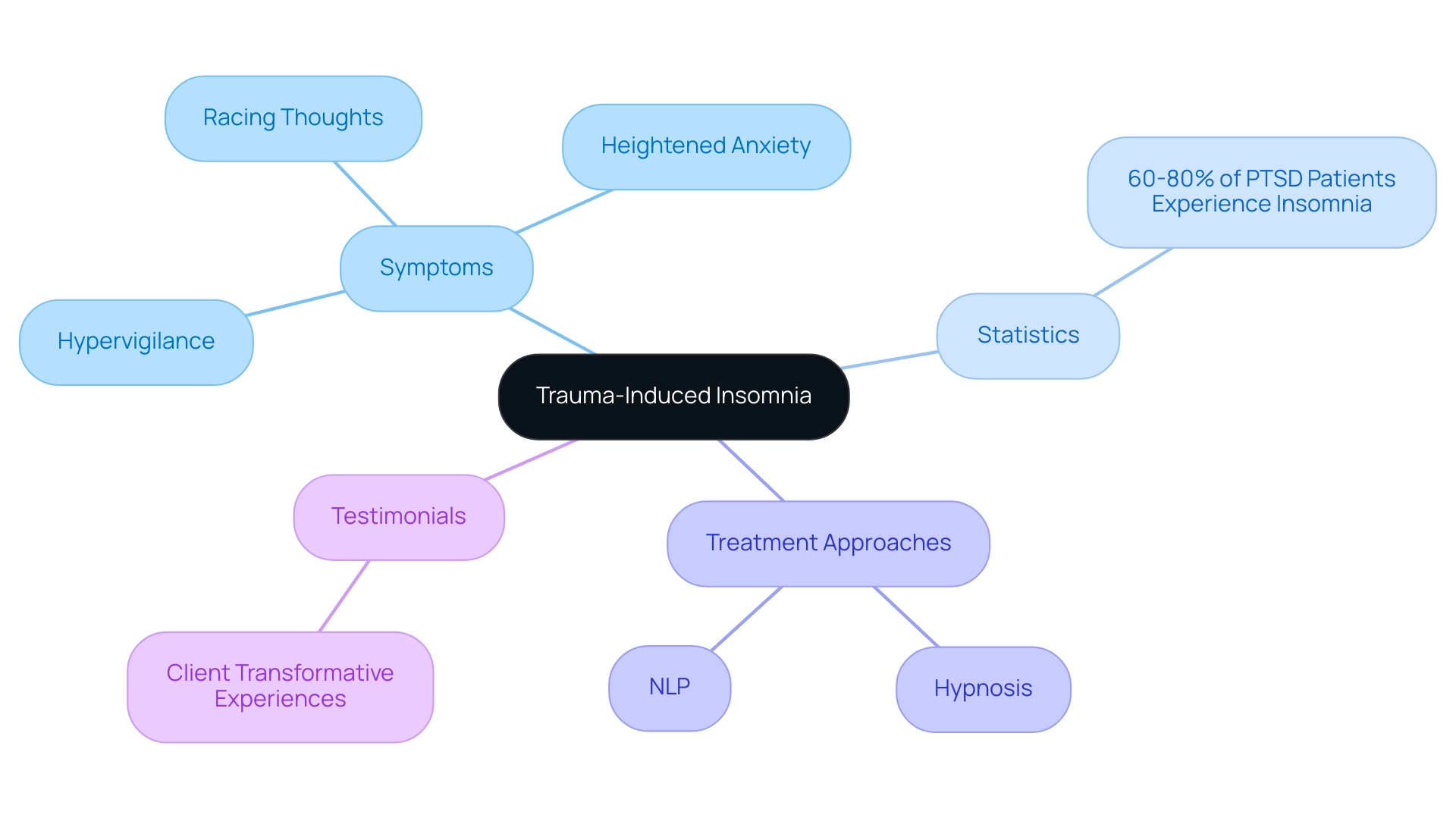
Managing Insomnia: Strategies and Herbal Remedies for Recovery
Addressing sleep difficulties following distress necessitates a gentle method that supports both your nervous system and mental well-being. Here are some effective strategies to consider:
-
Cognitive Behavioral Therapy for Insomnia (CBT-I): This well-structured program focuses on identifying and replacing the thoughts and behaviors that contribute to your rest difficulties. CBT-I has demonstrated significant effectiveness for survivors, as it directly addresses the underlying causes of insomnia. Statistics suggest that this method produces medium effect sizes in alleviating rest issues, with studies indicating that up to 70% of trauma survivors experience improved quality of rest after undergoing CBT-I. Renowned specialist Dr. Jane Smith states, "CBT-I is not just a treatment; it's a transformative experience that empowers individuals to reclaim their rest."
-
Relaxation Techniques: Incorporating practices such as deep breathing, progressive muscle relaxation, self-hypnosis, or mindfulness meditation can be profoundly beneficial. These techniques help calm the mind and prepare the body for restorative rest. Research shows that these methods can significantly enhance rest quality and offer a soothing presence during your nighttime routine.
-
Herbal Remedies: Nature offers a variety of calming herbs, including valerian root, chamomile, and passionflower, known for their soothing effects on the nervous system. For instance, a case study highlighted the success of a client who used valerian root and experienced a marked improvement in rest quality. It’s important to consult with a healthcare professional to determine the most suitable herbal supplements for your individual needs.
-
Lifestyle Changes: Establishing a regular rest schedule and a soothing nighttime environment is essential. Limiting caffeine consumption and reducing screen time before bed can greatly enhance your rest quality. These small adjustments can create a serene environment conducive to peaceful rest.
-
Hypnotism: Working with board certified hypnotists, such as Todd and Gina Goodwin, can offer assistance in addressing the underlying distress and anxiety that may be impacting your sleep. Their approach utilizes hypnosis and NLP to promote emotional healing and relaxation, helping you navigate the complexities of trauma-induced insomnia. The emotional trauma recovery program at Goodwin Hypnosis focuses on targeting root causes rather than just symptoms, allowing for profound transformations. Client testimonials show that individuals indicate reclaiming their lives and rest quality through these techniques, with many noting significant improvements in their overall well-being and rest patterns.
By adopting these strategies, you can foster a supportive atmosphere for recovery, enabling you to restore your rest and emotional equilibrium. Each step taken is a meaningful movement toward healing, and you deserve this journey of restoration.
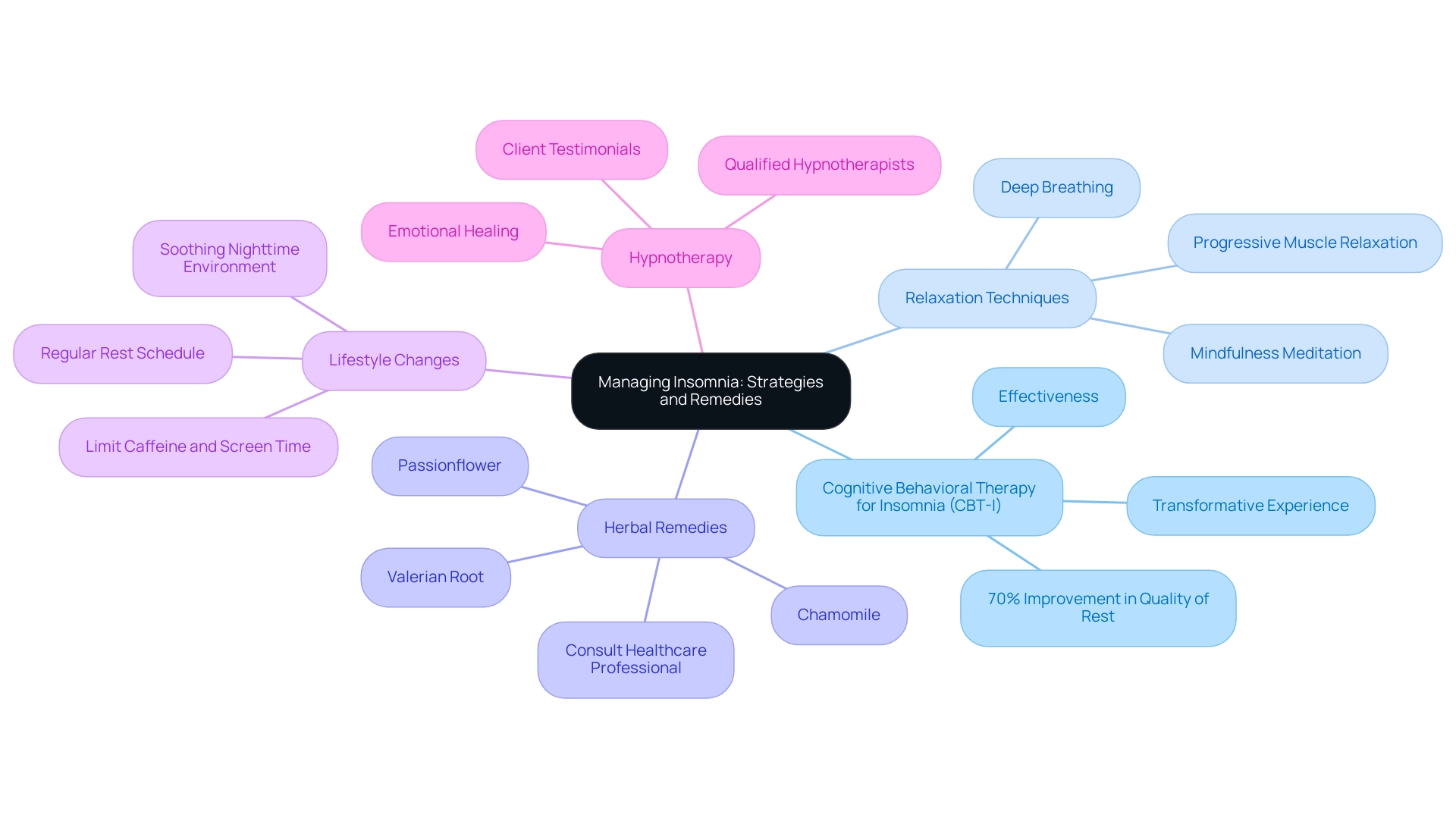
Creating a Sleep-Conducive Environment
Creating a sleep-friendly atmosphere is essential for addressing sleep difficulties, particularly for individuals dealing with the intricacies of trauma. Research indicates that factors such as noise and light can significantly impact the quality of rest, with studies showing that up to 30% of individuals with insomnia report disturbances from their resting environment. Here are some thoughtful tips to help you create a soothing space for restorative sleep:
-
Dim the Lights: Opt for soft, warm lighting in your bedroom to cultivate a tranquil atmosphere. Blackout curtains can be a game-changer, effectively blocking out disruptive external light and assisting your body in getting ready for rest. According to the Institute of Medicine, "There is a large body of data on these disorders, in part because they encompass the most frequently cited disorders related to rest or they carry the greatest public health burden."
-
Control Noise Levels: Reducing noise disturbances can significantly enhance your rest quality. Consider using earplugs or a white noise machine to create a peaceful soundscape. Gentle, soothing sounds can also help you transition into rest, fostering a calm environment. For example, individuals with Delayed Sleep Phase Syndrome often experience significant delays in slumber onset due to environmental noise, which can impair job performance and increase daytime irritability.
-
Keep the Room Cool: A cooler room temperature, ideally between 60-67°F (15-19°C), signals to your body that it's time to rest. Adjust your bedding and maintain a comfortable temperature to facilitate a deeper rest experience.
-
Choose Comfortable Bedding: Investing in a supportive mattress and pillows tailored to your preferred resting position can greatly impact how well you rest. The appropriate bedding not only improves comfort but also adds to your overall rest quality.
-
Limit Distractions: To create a sanctuary for rest, keep electronic devices out of the bedroom. Assign this area for relaxation and rest, permitting your mind to unwind without the distractions of screens and notifications.
By implementing these strategies, you can cultivate a serene resting environment that promotes relaxation and encourages the restorative rest your body and mind need, ultimately enhancing your well-being.
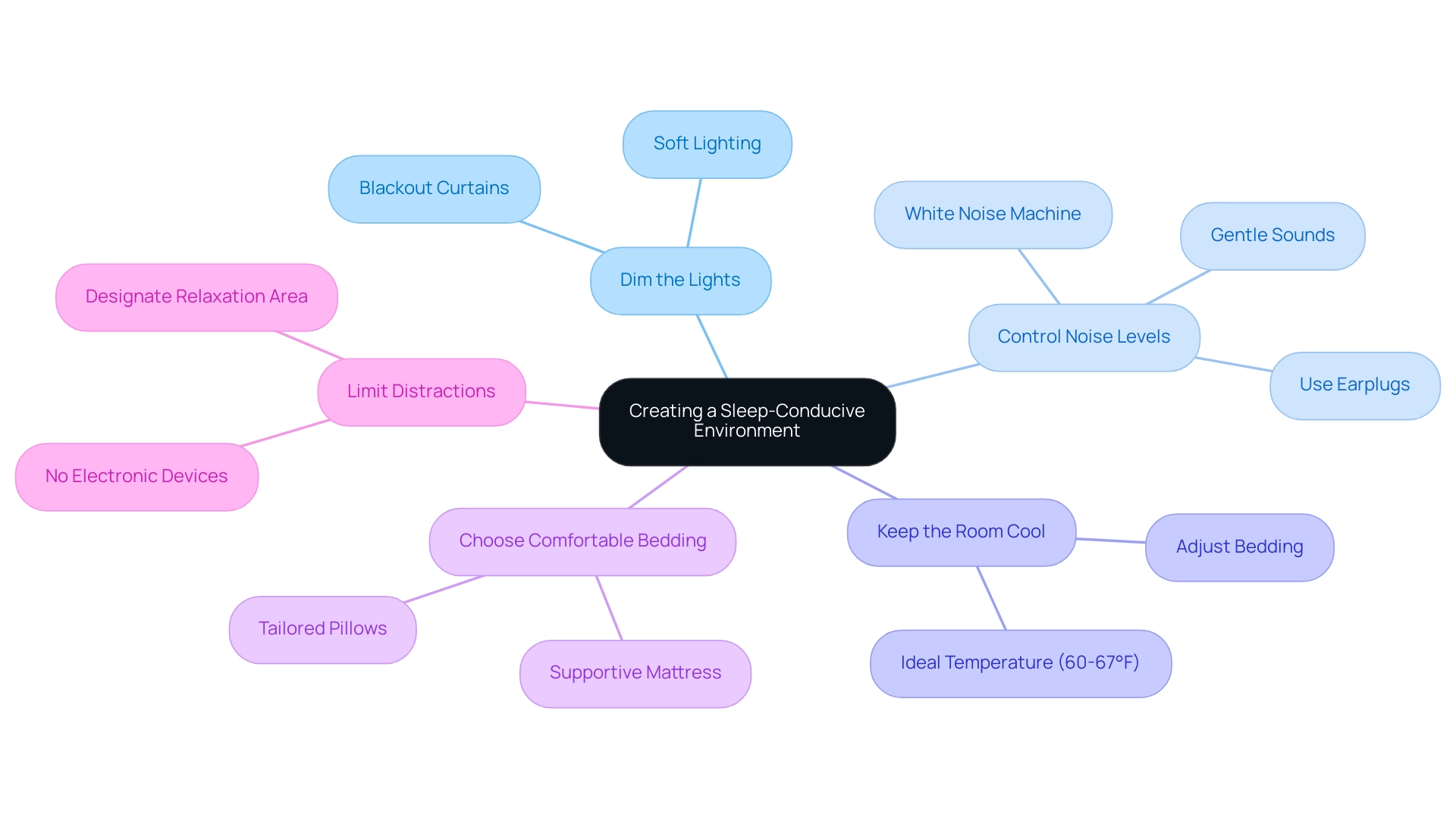
The Role of Mindfulness and Meditation in Sleep Recovery
Mindfulness and meditation provide effective methods for addressing sleep disturbances resulting from trauma. Here’s how to weave these practices into your daily routine for enhanced sleep quality:
-
Mindfulness Meditation: Dedicate a few minutes each day to mindfulness meditation. Focus on your breath, allowing thoughts to drift away without judgment. This simple yet profound practice can help quiet your mind, significantly reducing anxiety levels associated with insomnia. A 2015 meta-analysis found that meditation not only aids in reducing anxiety but also contributes to lower blood pressure, which can further enhance recovery during rest.
-
Guided Imagery: While in a relaxed position, visualize a serene scene—perhaps a tranquil beach or a lush forest. Guided imagery serves to distract your mind from intrusive thoughts, fostering a sense of calm and safety that can be especially beneficial for those dealing with trauma. As Joslyn Jelinek, LCSW, ACSW, RDDP, notes, "Is a walking meditation different from taking a walk? It can be," highlighting the various forms meditation can take.
-
Body Scan Technique: This technique involves mentally scanning your body from head to toe, consciously identifying areas of tension and inviting relaxation into those spaces. Participating in a body scan can encourage physical relaxation, making it easier for your body to transition into rest. Research indicates that meditation helps relax nerve signals that regulate heart function, contributing to lower blood pressure and a more restful state.
-
Gratitude Journaling: Before bedtime, jot down three things you are grateful for. This practice encourages a shift in focus away from stressors, nurturing positive thinking and improving overall rest quality. Cultivating gratitude has been shown to foster emotional resilience, which is crucial for those navigating the consequences of distress.
-
Gentle Yoga: Incorporate gentle yoga stretches into your pre-bedtime routine to help ease physical tension. These movements indicate to your body that it’s time to wind down, creating a restful atmosphere suitable for rest.
By integrating mindfulness and meditation into your daily life, you can foster a sense of peace and emotional resilience. This not only paves the way for improved sleep but also nurtures your overall well-being, allowing you to manage the effects of adversity more effectively.
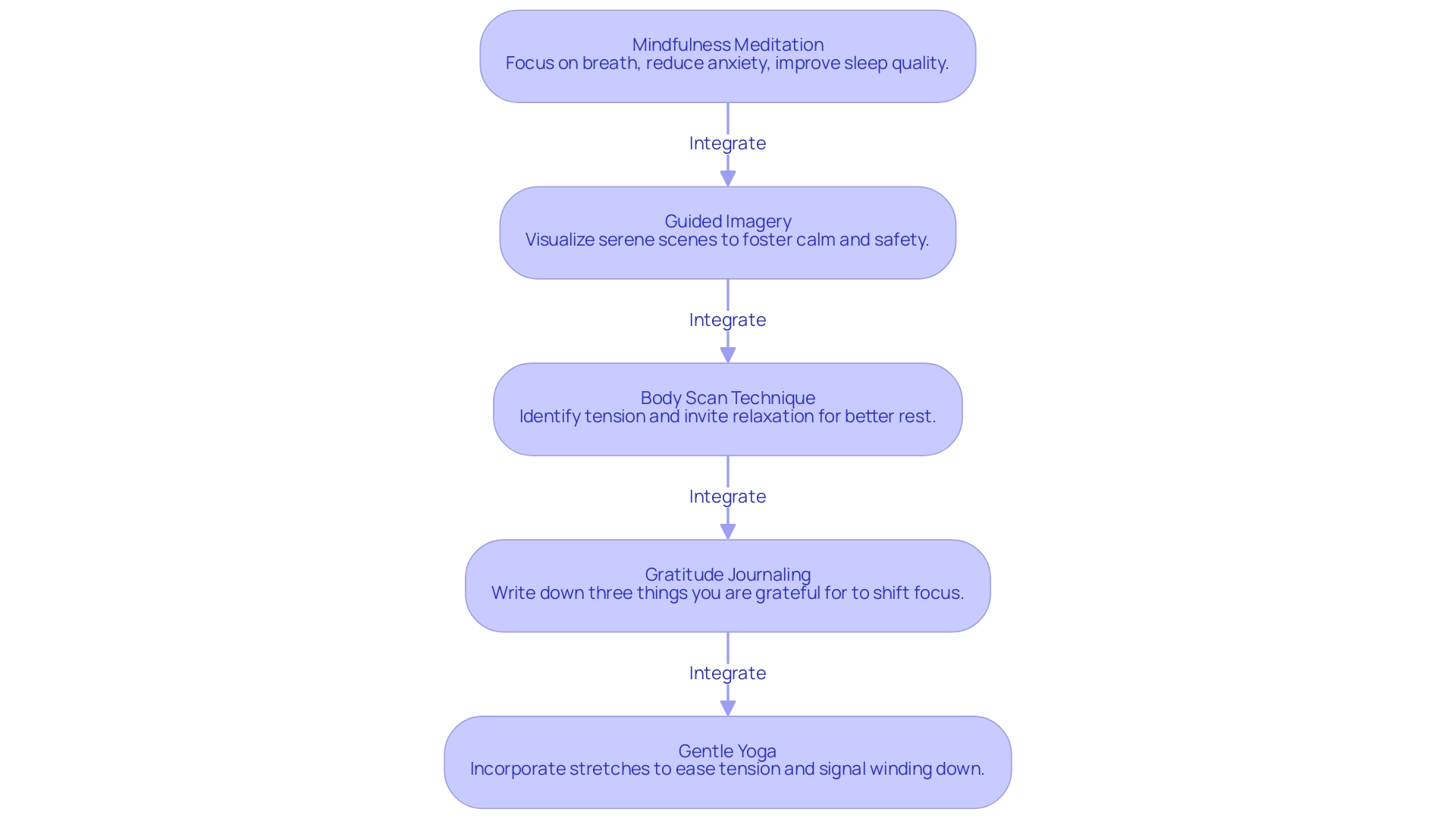
Seeking Professional Support
If you find yourself struggling with sleeplessness despite trying self-help strategies, reaching out for professional support can be a crucial step in your healing journey. Here are several compassionate options to consider:
-
Therapist or Counselor: A licensed therapist can guide you in uncovering the underlying causes of your insomnia and trauma. They may offer effective treatments such as Cognitive Behavioral Therapy for Insomnia (CBT-I) or Eye Movement Desensitization and Reprocessing (EMDR), both of which have demonstrated positive results for many people. In fact, studies indicate that approximately 70% of individuals undergoing CBT-I report significant improvements in rest quality.
-
Hypnotist: A trained hypnotist specializes in using hypnosis to delve into deeper emotional issues. This approach can promote relaxation and facilitate the healing process, helping you reconnect with a sense of calm. Our individual sessions employ hypnosis, NLP, and memory reconsolidation, enabling you to address emotional trauma and regain your rest. Recent trends indicate a growing acceptance of hypnosis as a complementary treatment for sleep disorders among mental health professionals. Many clients have reported significant enhancements in their rest patterns after just a few sessions.
-
Rest Expert: If difficulty in resting persists in affecting your life, seeking advice from a rest expert can be essential. They can assess potential disorders related to rest and provide personalized treatment options designed for your unique needs. Case studies have shown that patients who consult with sleep specialists often experience a notable decrease in sleep-related symptoms within a few weeks.
-
Support Groups: Connecting with others who share similar experiences can provide a comforting sense of community. Participating in a support group centered on trauma recovery can promote understanding and connection, enabling you to share your journey with those who genuinely comprehend. Current trends suggest that peer support is becoming increasingly recognized as a vital component of effective recovery strategies.
-
Integrated Care Approach: Some practitioners offer an integrated care model, blending mental health support with alternative therapies like acupuncture or nutritional counseling. This holistic approach can address insomnia from multiple angles, nurturing both your mind and body. Evidence from recent studies indicates that integrated care models can lead to better overall outcomes for individuals struggling with insomnia.
Remember, seeking help is not just a sign of vulnerability, but a profound act of strength. Professional support, including our transformative hypnotherapy sessions, can significantly enhance your recovery journey, helping you reclaim restful sleep and a sense of well-being. To learn more about our services or to schedule a session, please contact us today.
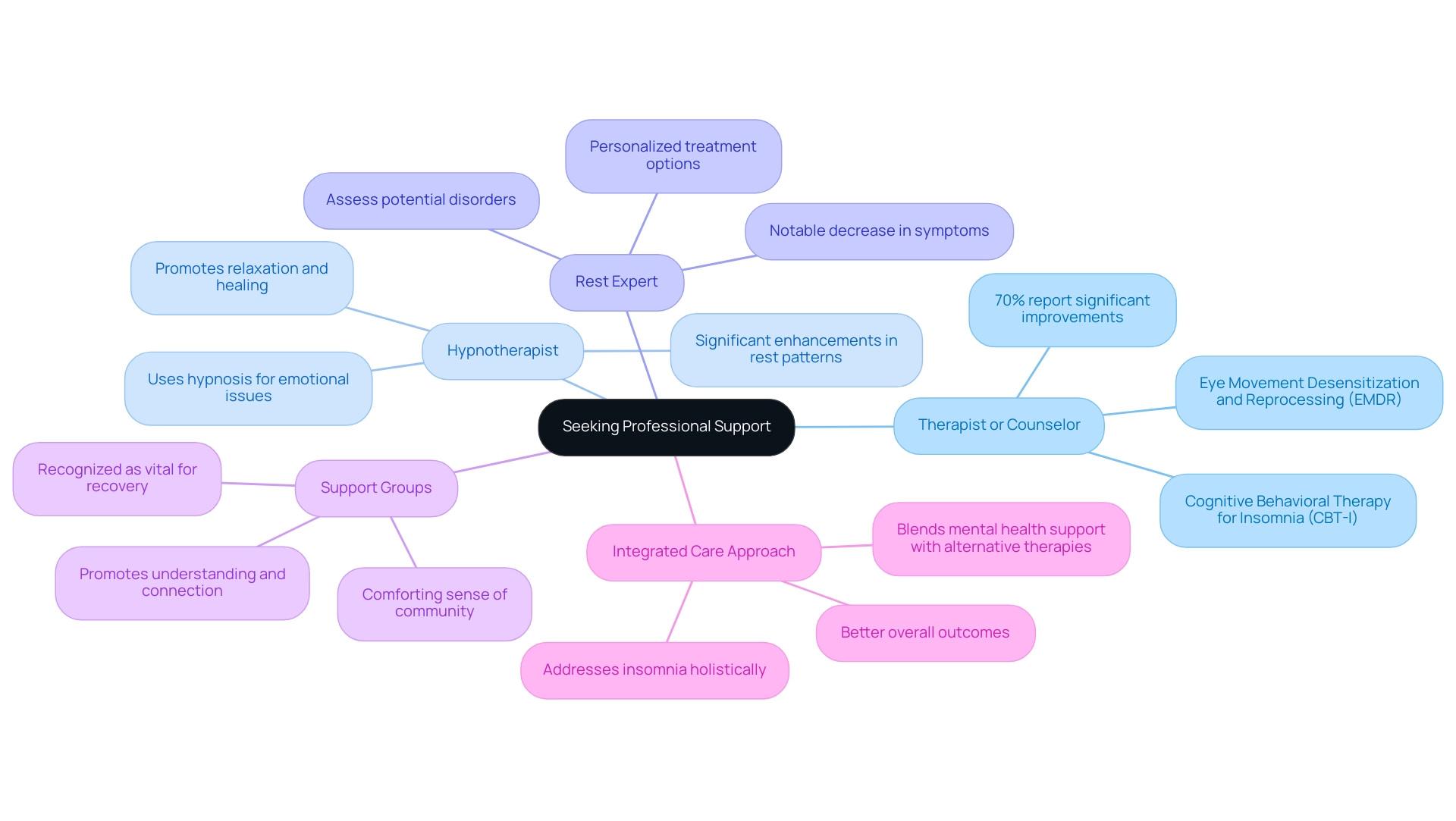
Conclusion
Navigating the complexities of trauma-induced insomnia can be a daunting experience, but it is essential to remember that healing is not only possible but within reach. This article has explored the profound psychological effects of trauma on sleep, highlighting the critical connection between emotional well-being and restful nights. By recognizing the impact of trauma on sleep quality, individuals can take significant steps toward recovery.
Implementing effective strategies such as Cognitive Behavioral Therapy for Insomnia, relaxation techniques, and creating a sleep-conducive environment can foster a nurturing atmosphere for healing. Additionally, incorporating mindfulness and meditation practices into daily routines can enhance emotional resilience and promote restful sleep. Seeking professional support, whether through therapy, hypnotherapy, or integrated care approaches, can further empower individuals on their journey towards improved sleep and emotional balance.
Ultimately, the path to reclaiming restful sleep and emotional well-being is a journey of self-discovery and empowerment. Each small step taken towards healing is a testament to resilience and strength. Embracing these strategies and seeking the right support can pave the way for profound transformations, enabling individuals to nurture their overall health and well-being.
The journey may be challenging, but every effort counts, and a brighter, more restful future awaits.




